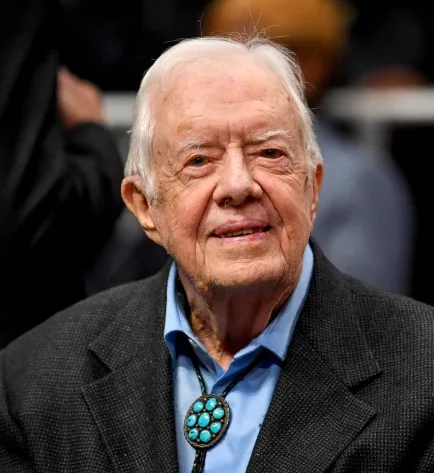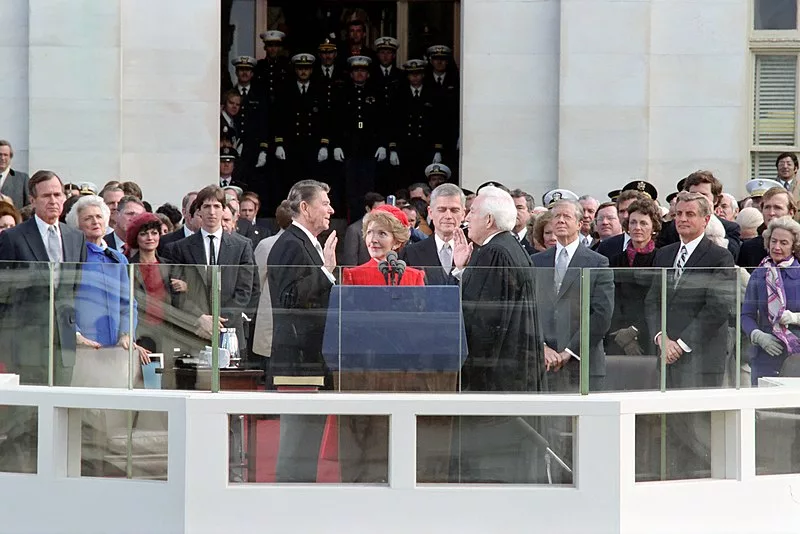
Presidential Decency

(1/20/81 – President Ronald Reagan takes the Oath of Office administered by Chief Justice Warren Burger with First Lady Nancy Reagan holding the bible — to the right of Chief Justice Burger is outgoing President Jimmy Carter and next to him outgoing Vice President Walter Mondale; on the left are newly-sworn-in Vice President George H.W. Bush and Barbara Bush in blue – photo credit)
I am old enough to remember when we took the peaceful transfer of presidential power for granted. I remember standing in the middle of Pennsylvania Avenue at the foot of the U.S. Capitol on January 20, 1981, when President Ronald Reagan was sworn into office after defeating President Jimmy Carter soundly in the 1980 presidential election. Crises were raging: American diplomats had been held hostage in Iran for 444 days; the economy was in shambles, energy was in scarce supply, Americans were tired of queuing up for gasoline and enduring the many dramas of that era. But both presidents handled the transition with dignity and grace, riding together in the same limo from the White House to Capitol Hill, and demonstrating comity and cooperation throughout the transition period. This was no different from what citizens expected, having witnessed numerous presidential transitions throughout our history — up until 2021 when the outgoing president refused to cooperate with the transition process, failed to attend the inauguration, and allegedly helped to inspire an insurrection.
Jimmy Carter, a thoroughly decent man, was the necessary antidote to the ugly corruption and turmoil of the presidency of Richard Nixon. Nixon presided over a nation besieged by the Vietnam War protests, riots and extensive domestic unrest, the monumental changes achieved by the civil rights and women’s rights movements. Nixon actually did some good things, like opening cooperative relations with China and creating the Environmental Protection Agency. But Nixon was a fundamentally deeply flawed man, and his presidency collapsed in the scandal of Watergate as he denied and covered-up his role in encouraging the burglary of Democratic headquarters during the 1972 election. He won that election in a landslide, but he resigned two years later in disgrace.
President Gerald Ford became the “accidental president” succeeding Nixon, but after pardoning Nixon President Ford could not win re-election, going down in defeat to Jimmy Carter. The transition from Ford to Carter was peaceful, revealing the fundamental decency and commitment to lawful governance that both men shared.
 I cite these examples because, 42 years after he left the White House, Jimmy Carter is back in the news following his decision to enter hospice care at home. He is 98 years old and has had numerous health problems; he is on the final stage of his long journey. Tributes are pouring in from all over, not unexpectedly for a former president, but this moment of memory and tribute comes with a special edge: the sheer decency of Jimmy Carter, a sharp contrast to the American experience of the presidency in more recent years.
I cite these examples because, 42 years after he left the White House, Jimmy Carter is back in the news following his decision to enter hospice care at home. He is 98 years old and has had numerous health problems; he is on the final stage of his long journey. Tributes are pouring in from all over, not unexpectedly for a former president, but this moment of memory and tribute comes with a special edge: the sheer decency of Jimmy Carter, a sharp contrast to the American experience of the presidency in more recent years.
Carter brought to the presidency a moral center that was essential for rebalancing the office after the turmoil of the Nixon years. He confronted numerous problems not of his making, and he also made problems arising from his refusal to play politics as usual, his notorious stubbornness about technically correct solutions that might have benefited from the lubrication of political compromise. But he never resorted to insulting rhetoric, to personal aggrandizement, to demonizing the opposition, to taking as much as he could for himself. He was not paranoid, the characteristic that debilitated Nixon. He was not grandiose nor a great communicator, the quality that so many found attractive in President Reagan. He just wanted to do the job the best way he knew how, with competence, honesty and integrity.
Many of the tributes today point out the fact that Jimmy Carter has had a longer post-presidency than any other president in American history. The legacy he built during the last 42 years out of office stands in sharp contrast to the post-presidency of others. Rather than building golf courses he spent time building homes with Habitat for Humanity. Rather than devolving into a morose habit of angrily blaming others for his failures and scheming to reclaim power, he became a global diplomat and peacemaker, eventually earning the 2002 Nobel Peace Prize for negotiating peace between Egypt and Israel. He is a true humanitarian, a true man of faith, teaching Sunday School and providing faith-based insights into how to construct a society of peace and justice.
As President Carter moves along the final steps of his journey, his example continues to remind us of the common decency we should expect of every person who serves as the president of the United States. Decency is not a trait of Republicans or Democrats, nor it is liberal or conservative, ideological or libertarian. Decency means being honest, forthright, respectful and caring for others. When Americans size-up presidential candidates, we can certainly assess where the politicians stand on the issues, we can assess charm and charisma, we can assess intelligence and stamina. But, most of all, we should assess whether the candidates are honest people of integrity and commitment — decency — and we should insist that the media, the parties, and all who shape elections present that side of the candidates clearly.
We give thanks to Jimmy Carter for reminding a drama-weary nation of the fundamental value of presidential decency.